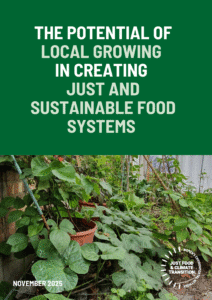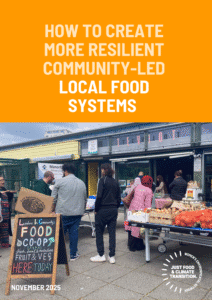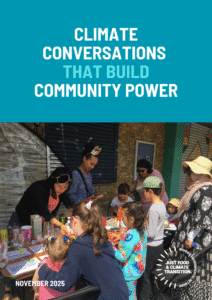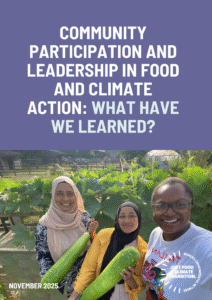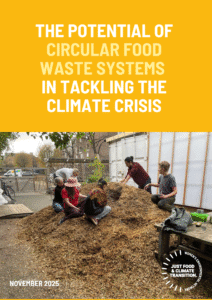The potential of local growing in creating just and sustainable food systems
This report shares our collective learning about community food growing from the Just Food and Climate Transition Programme (Just FACT) programme. We hope it can be a useful resource for people who are interested in how food grown by residents can support just, sustainable and secure food systems within UK boroughs.
In this report we explore the wide-ranging benefits of local food growing, and how it is key for local food security and community resilience. We look at the different types of food growing projects in Just FACT, including urban farms, community gardens, and roof-top growing. We show how underused land can be bought into growing use with the right support, harnessing the knowledge, skills and love of growing held by local people. The report also looks at the role of technological innovations, with hydroponics and anaerobic digestion being trialled in the borough. It summarises the key challenges faced by groups and organisations and shares their recommendations for action.
DOWNLOAD HERE
Summary of key learnings
Local food growing has extensive social, environmental and health benefits
- It improves local food security by increasing the accessibility of fresh produce
- It reduces isolation and improves wellbeing
- Carbon savings are made through sustainable food growing practices and avoiding transport emissions
- Community gardens boost local biodiversity and save water through rainwater harvesting
- Food growing connects well with other forms of climate action and/or projects that meet other community needs
There is an abundance of knowledge and skills within the local community
- Specialist knowledge of diaspora growers can contribute to adapting local food production to a changing climate. The Bangladeshi community have adapted their cultivation of crops like khodu, coriander and uri, so they can be grown locally instead of being imported
- Many local women have gardening and community development skills and could play a vital role in local food growing efforts
There is untapped potential for local food growing
- Underused land and space can be unlocked for food growing; from playgrounds, disused car parks, alleyways, garages, rooftops and more
- Local food growing efforts could be bolstered by technological innovation, such as the use of hydroponics
Challenges that need to be overcome
- It is hard for residents to get long term access to land and space
- Short-term grants for food growing projects create instability and job insecurity
- Reliance on volunteers can pose challenges where roles require consistent or long term commitment
- Community gardens aren’t always accessible or inclusive
Summary of key recommendations
- Unlock more land through a Right to Grow
- Unlock funding to support local growing initiatives and for organisations and to employ local people from diaspora communities as growers
- Support food growing networks
- Provide opportunities for school children to learn about growing
- Provide opportunities for communities to meaningfully input into decisions about food, growing and land in the borough
- Support local growing projects by procuring their produce
- Address barriers to involvement that are faced by underrepresented groups
Contents
- Introduction
- Summary
- Context
- Local growing can boost food security while cutting ‘food mile’ emissions
- Diaspora growing knowledge is key to a fair food system
- It is possible to unlock underused land and space
- Technological innovation can help us scale circular food systems
- Investment in growing jobs can tackle employment inequality
- Food growing can bring communities together on climate change
- Food growing leads to healthier and more connected communities
- The challenges we need to overcome
- Our calls to action

